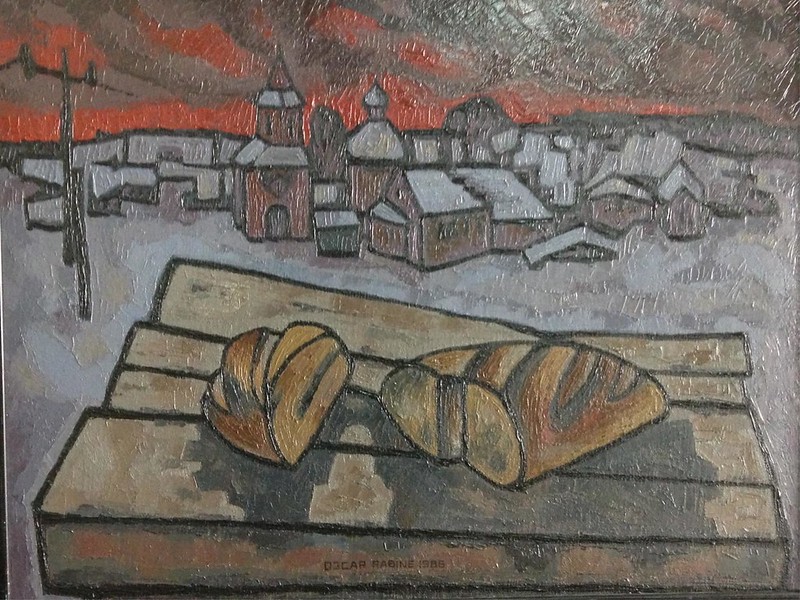Bread on the Table
Bread on the Table
Brian Zahnd
The church in Western Europe and North America is struggling with deep disappointment. We are disappointed with the failure of the Christendom project. The grand attempt to produce a continent of Christian civilization through the apparatus of the state is either dead or dying. It appears that secularism has already won in Europe and will win in North America. So we either deny it (more easily done in America), or we angrily blame scapegoats (those we claim have “compromised the gospel”), or we simply trudge along, a bit sad about it all.
The church in the post-Christendom world is walking the Emmaus Road. Confused and disappointed. Just like those two disciples on the first Easter. (see Luke 24:13-35) The original Emmaus Road disciples had misread everything. Their disappointment was a result of their wrong expectations. They expected a conventional king after the model of the Pharaohs and Caesars. They expected Jesus to be a war-waging Messiah like King David or Judah Maccabeus. What they ended up with was a “failed” Messiah — a Messiah executed by the Romans. The movement in which they had invested all their hope had failed. So they walked the Emmaus Road with soul-crushing disappointment. This is when Jesus came and walked with them “in another form.” (Mark 16:12)
When Jesus in the guise of a wayfaring stranger remarked upon their evident sadness, the disciples told how they had hoped that Jesus of Nazareth was the long-awaited Messiah, the one who would redeem Israel. But that was all over. Their hopes had been dashed when their would-be Messiah was condemned by the priests and crucified by the Romans. Their movement had failed and disappointment had settled in.
That evening as they sat together at table, the mysterious Stranger took the bread, blessed and broke it, and, when he offered the bread…something incredible happened! For an instant the two disciples recognized the Stranger as…Jesus!…then he vanished! Poof! Gone! But the bread Jesus had been holding in his hands fell to the table. The blessed and broken bread hit the table in a most emphatic way! Jesus had been recognized for a fleeting moment, then he had vanished. But in his place the bread remained. Don’t miss that. The Bread Remained! When the two disciples had rushed back to Jerusalem to tell the good news, “they told what had happened on the road, and how he was made known to them in the breaking of the bread.” (Luke 24:35)
Selah.
Here we behold the Eucharistic mystery — the sacred mystery that Christ is present with us in the blessed and broken bread. This is the point of the dramatic gesture at the climactic moment in the Emmaus Road story: Jesus is present as bread on the table!
Of course, this is a very different presence than what was anticipated by the Emmaus Road disciples or the heirs of Christendom. What they wanted was a conventional king on a throne of political power. What they got was broken bread on the Communion table. The false hope for Christ’s kingdom to be one of conventional political power was always bound to disappoint the Emmaus Road disciples, the architects of Christendom, or the modern-day Religious Right. Jesus will not be with us as a means of conventional political power. Jesus will be with us as bread on the table. Christ is present as sacramental mystery, not political action committee. Blessed are they who are not disappointed.
For those Christians who have hoped to shape the culture through political pressure and legislative coercion, these are days of anger, frustration, and disappointment. But for those who are willing to enter the sacramental mystery of Christ present as bread on the table, these are days of new hope. It is only our false hopes that are being disappointed in the death of Christendom. Jesus never intended to change the world through battlefields or voting booths. The kingdom of God does not come by bullets or ballots, but by baptism and bread. Jesus has always intended to transform the world one life at a time at a meal table. At the church I pastor we no longer hand out “Christian voting guides,” but every Sunday we offer “the body of Christ broken for you.”
I’m not angry or even disappointed that Christendom has failed and that we live in a secular age. We have the mystery of the Eucharist. We offer the world the bread and wine, the body and blood of Christ. My sermons don’t end with, “Now, go to the voting booth and change the world!” My sermons end with, “Now, come to the Communion table and receive the life of Christ.”
Christ is present with us. He is present in the Eucharist. He is bread on the table.
This is enough. I am not disappointed. My heart burns within me.
BZ
PS: Lest this post be misread as quietism, I refer you to my new book, A Farewell To Mars, where you will find a good deal of my political theology.
